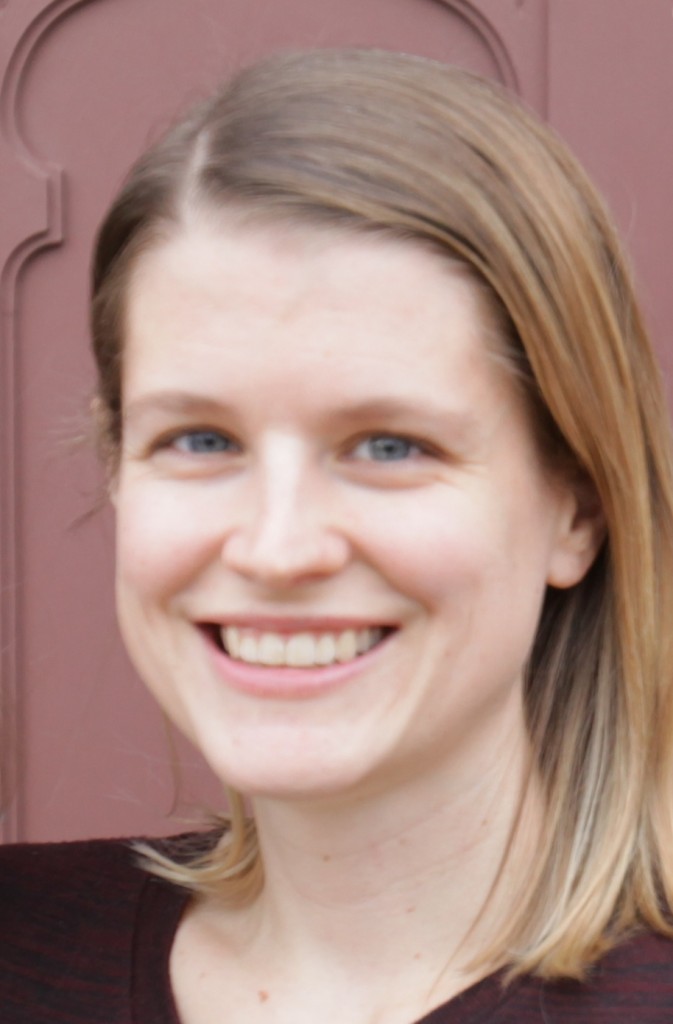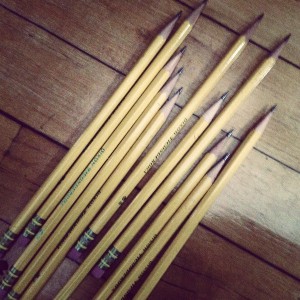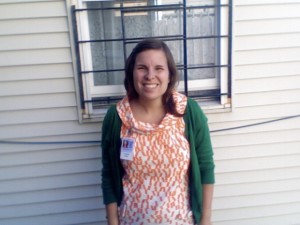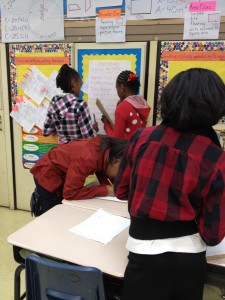I walked out into the alley behind our house to dump the trash into the dumpster, only to nearly miss stepping on a used condom. It, along with the torn Trojan man package, was directly in front of our back gate. My daughter, age three, was right behind me–in bare feet.
“Oh no, honey,” I said pushing her backward with my hand. “You stay inside the yard. You don’t have shoes on; there might be broken glass.”
I opened the dumpster and threw in the trash bag, sidestepping the condom and three white crumpled tissues. I eyed a purple needle. I turned around and walked back into the yard, my lips pursed. Something happened in the alley right outside my gate, some sexual act. Someone left this remnant here, a sign that it happened. So much goes on in this neighborhood, in this great big city, that I never even know about.
I wished that my husband was home. He was away for a week, and at night I worried about the door. Was it locked? Should I go check? What would I do if someone broke in? My cell phone was resting on the dresser; would I have time to reach it if someone came thumping up the stairs? I was nestled under the covers in-between my kids — a chubby-kneed baby and a long-limbed preschooler — and feeling the weight of protecting them.
I never thought I would be scared to live here. I spent a good deal of my early 20s in this inner-city neighborhood. It’s where my husband and I dated, got engaged, and rented our first apartment. It’s where we brought our daughter home from the hospital as a newborn. And it’s where we discovered a little Mennonite church a few blocks away where, for the past five years, I have spent most Sunday mornings singing songs about peacemaking.
 I felt naïve, not knowing what it would be like to steer my daughter around smashed beer bottles on our sidewalk, to tell her to keep her tricycle inside our gate, to avoid the playgrounds where young men are sitting on the swings, smoking. “But, why, mama?” she wonders, and I don’t know what to tell her. I want her to be confident, to free range all around her environment like those happy cage-free chickens, to not need my constant, watchful presence.
I felt naïve, not knowing what it would be like to steer my daughter around smashed beer bottles on our sidewalk, to tell her to keep her tricycle inside our gate, to avoid the playgrounds where young men are sitting on the swings, smoking. “But, why, mama?” she wonders, and I don’t know what to tell her. I want her to be confident, to free range all around her environment like those happy cage-free chickens, to not need my constant, watchful presence.
So why, why, do we live here? I tell myself we’re here because place matters. Where we live matters. What we see every day, the people we come in contact with, the reality of our communities — they matter. Our place, our community, shapes what is “normal.” For every smashed beer bottle, there are dozens of friendly “hellos” and shared toys over the fence with the Somali family next door. For every waft of second-hand smoke, there are kind strangers holding open the door for my double stroller at the Dollar Store.
And I want to go down kicking and screaming against the mantras of the American dream, that more stuff and homogenous living is better. I want to rail against the malaise of centering only on me and mine and my kind. I want my kids to know that their whiteness is just one color among many. Because I want to be where God is dwelling, and God is here, or so I’ve been told.
The day after I found the condom I opened the door to our backyard, a serene patch of green contained inside a privacy fence. As my daughter squeezed past me to go outside and play, I heard the voices – loud and strained and scary. Neighbors were fighting. No, they were screaming.
“Mom, mom,” my daughter said as she lingered on the back steps. “What’s that noise?”
“Inside,” I said, pulling her back into the house, closing the door firmly behind us. My daughter’s eyes were confused, searching mine. I brusquely pulled out the watercolor paints and paper to occupy her, my heart pounding all the while.
As I watched my daughter paint at the kitchen table, I thought about friends who have lived on our block for over 30 years. They raised two sons who thrived, sent them to public schools, and volunteered countless hours in the community. People always wondered, always asked them: How did you do it? How did your kids turn out so well? And they replied: You never need to warn your kids about abusing alcohol when they see drunks walking down the block every day.
My kids, like their kids, will be okay, right? God is here, I reminded myself, as I swallowed back my fear. God is redeeming it all. I looked back over at my daughter, hunched over her painting. I peered over her shoulder and admired her splotchy stick-figures, their colors black and brown and pink. “Isn’t it beautiful?” she asked, turning her sunny face toward mine. “Yes,” I replied as I touched the wet construction paper. “Yes, it is.”
* * * * *
 Stina Kielsmeier-Cook a writer and recovering idealist from the cold north where she raises kids, maxes out her library card, and is usually late for church. A former housing advocate for refugees, Stina loves to talk about social policy, parenting and her neighborhood in Minneapolis. She blogs at www.stinakc.com and can be found tweeting, badly, at @stina_kc.
Stina Kielsmeier-Cook a writer and recovering idealist from the cold north where she raises kids, maxes out her library card, and is usually late for church. A former housing advocate for refugees, Stina loves to talk about social policy, parenting and her neighborhood in Minneapolis. She blogs at www.stinakc.com and can be found tweeting, badly, at @stina_kc.
Broken bottle photo by Lig Ynnek
 rayon-drawn cards, apology notes with misspelled superlatives, and portraits where the size of my head dwarfs my torso. In one early drawing, a student depicted me with flowing red hair and a bikini. I have two guns in holsters at my hips and a rainbow behind me.
rayon-drawn cards, apology notes with misspelled superlatives, and portraits where the size of my head dwarfs my torso. In one early drawing, a student depicted me with flowing red hair and a bikini. I have two guns in holsters at my hips and a rainbow behind me. liberal arts educations behind us, hailing from some of the top universities in the country and swearing our scout’s honor that we worked hard and could make it through a few years teaching in the inner city.
liberal arts educations behind us, hailing from some of the top universities in the country and swearing our scout’s honor that we worked hard and could make it through a few years teaching in the inner city.
 for another student in our room. Like any relic, its meaning was held in the knowledge of the one who owned it, like the rag of an apostle’s robe or the heel bone of a saint.
for another student in our room. Like any relic, its meaning was held in the knowledge of the one who owned it, like the rag of an apostle’s robe or the heel bone of a saint. 